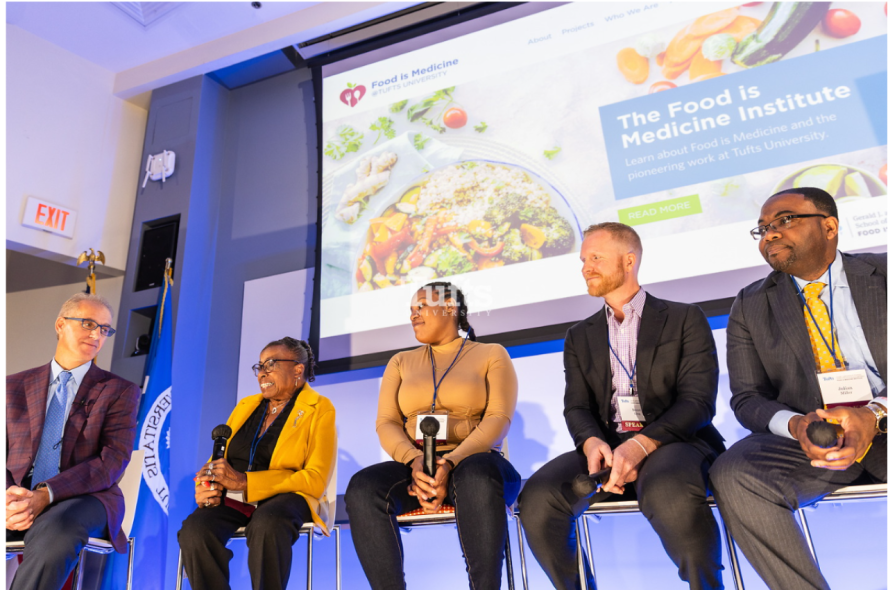-
About
- Departments & Offices
-
Academics
- Public Health
- Biomedical Sciences
- Physician Assistant
- Special Master’s (MBS)
-
Admissions & Financial Aid
- Tuition & Fees
-
Student Experience
-
- Student Resources by Program
- Academic & Student Support
- Wellness & Wellbeing
- Student Life
- Events & Traditions
-
-
Research
- Research Labs & Centers
- Tufts University-Tufts Medicine Research Enterprise
-
Local & Global Engagement
- Global Health Programs
- Community Engagement
New Institute Aims to Change Health Care Through Nutrition
The Food is Medicine Institute will advocate for food-based solutions to fight illness, including produce prescriptions, nutrition education for doctors, and more

A newly launched, first-of-its-kind institute aims to address a glaring gap in the medical system by working to integrate food-based nutrition interventions into health care to treat disease and advance health equity.
The Food is Medicine Institute at the Friedman School of Nutrition Science and Policy at Tufts University establishes a university-wide initiative aimed at transforming health care through scalable food-based interventions such as: medically tailored meals and prescriptions for produce; nutrition education for doctors; and clinical care, electronic health record, and reimbursement pathways for nutrition-based tools to help treat or prevent diet-related illnesses such as heart disease, diabetes, and certain cancers and complications during pregnancy. The Institute will advance Food is Medicine research, patient care, and community and policy engagement nationwide and beyond, and be a leader in educating the next generation of professionals in the Food is Medicine space.
“The Institute builds on Tufts’ rich array of schools, our role as a leading research university, and our position as a pioneer in nutrition education and scholarship,” said Tufts University President Sunil Kumar. “It also reflects our university-wide commitment to advancing societal equity while tackling difficult global challenges.”
Inadequate diet is responsible for more deaths worldwide than any other risk factor, including smoking tobacco. In the U.S., it’s the number one driver of poor health, leading to more than half a million deaths a year and costing more than $1.1 trillion in health costs and lost productivity. And poor nutrition disproportionately affects people with lower-incomes, rural communities, and historically marginalized racial and ethnic groups.
Research has shown that food and nutrition interventions incorporated into a patient’s treatment plan could lead to improved health outcomes and lower health care costs.
In addition to bringing together faculty and students from the Friedman School and Tufts University School of Medicine, in collaboration with the Tufts Medicine health system, the Institute will engage with the private and public sectors. “One of the pillars of this cross-school institute is developing synergies with other innovators with national and international reach to broaden its impact,” said Tufts University Provost and Senior Vice President Caroline Genco.
“The Institute is an important next step in advancing the Friedman School and Tufts’ commitment to research, training, and bringing evidence-based food and nutrition programs to our health care system,” added Christina Economos, dean of the Friedman School.
Among the organizations the institute has convened are Kaiser Permanente, John Hancock, and Google, each of which is engaged in Food is Medicine efforts to prevent and treat health disorders and reduce health disparities.
The Institute is collaborating with Kaiser Permanente on the design, implementation, and assessment of three clinical trials: a produce prescription intervention for patients with diabetes in southern California, a research clinical trial of patients with diabetes who are receiving “fresh funds” every month to buy healthy foods online; and a trial to be conducted in Georgia involving high-risk pregnancies.
The Institute will be working with Google to explore how technology, including artificial intelligence, can help provide high quality nutrition information.
“It’s exciting to see that Food is Medicine interventions can have an immediate impact on health and well-being. We don’t have to wait years to see a benefit,” said the Institute’s Director Dariush Mozaffarian, distinguished professor, dean emeritus and Jean Mayer Professor of Nutrition at the Friedman School, which he led for eight years, and professor at the School of Medicine.
Mozaffarian also emphasized that Food is Medicine is one of the rare advances in health care that can also help address health disparities. “As a heart doctor, it’s great to see innovation and equity finally coming together.”